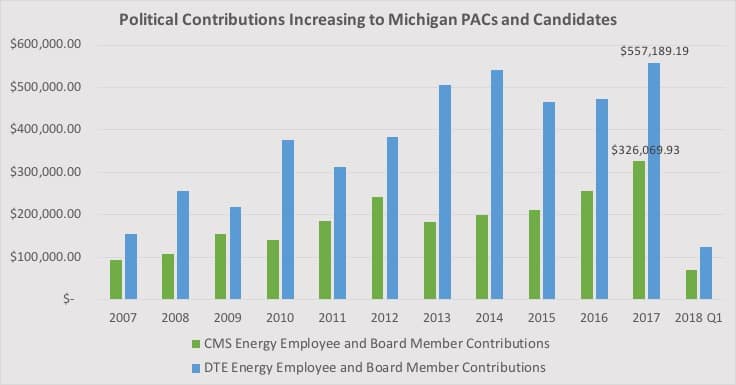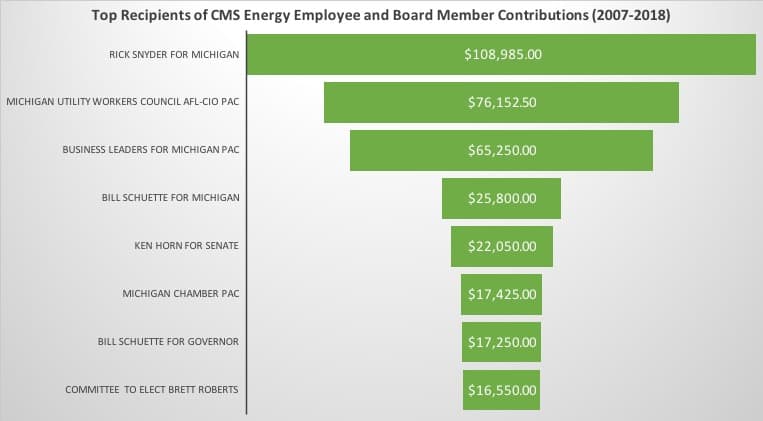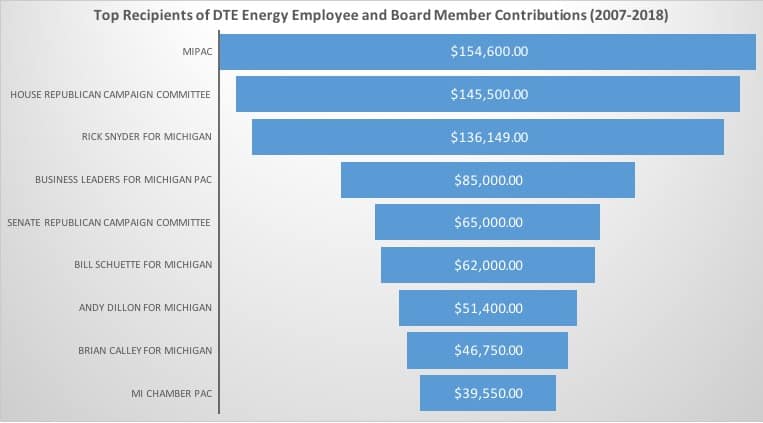An Energy and Policy Institute analysis of Michigan Secretary of State campaign data from 2007 through the first four months of 2018 identified at least $6.5 million in contributions from individual employees and board members of Consumers Energy and DTE Energy. The data further shows how over the past ten years, employees, executives, and board members for two largest utilities in the state have been increasing their individual contributions to Michigan candidates and political action committees.
In 2017, Consumers Energy individuals contributed over $326,000, while DTE Energy individuals contributed over $557,000. Those contributions were the highest recorded for each company over the past decade, as the chart below depicts. The Michigan Campaign Finance Network (MCFN), which has been tracking money in politics for about two decades, has detailed how the amount of money spent by individuals and PACs to influence voters in the state continues to increase.

(Michigan Secretary of State campaign data)
Analysis of the data also reveals that just dozens of current and former high salaried executives and board members for DTE Energy and Consumers Energy make up roughly a quarter of the total contributions during this timeframe for each company.
DTE Energy board members James Nicholson, current chairman of the chemical company PVS Chemicals, and Mark Murray, a former president of Meijer, are by far the largest political contributors. But current DTE Energy CEO Gerard Anderson and Consumers Energy CEO Patricia Poppe, along with some members of their current executive staff, have contributed a considerable amount of money given the state’s median income is about $52,000.
Much of the money went to the utilities’ respective PACs – CMS Energy Corp Employees for Better Government and DTE Energy Company Political Action Committee, where it was then mainly distributed to legislators and their connected PACs. Indeed, in 2016, MCFN found that since 2011, DTE and Consumers PACs were among the top 10 donors for 78 of the 145 legislators at the time – and have given to all but four state lawmakers.
However, hundreds of thousands of dollars separately went to other independent PACs and candidates provided by the individuals at the utilities.

(Michigan Secretary of State campaign data)

(Michigan Secretary of State campaign data)
Governor Snyder and Attorney General Bill Schuette – who is running to replace Snyder this year – were among the top recipients of individual employee contributions in addition to receiving donations from each of the utility PACs.
The influential Michigan Chamber of Commerce PAC was also a top recipient of cash from utility employees, along with the PAC associated with the Business Leaders for Michigan, the state’s business roundtable composed of board chairs, CEOs, and senior executives in the state. Both utility companies are members of the Michigan Chamber of Commerce. The CEOs of DTE Energy and Consumer Energy are members of the Business Leaders for Michigan, as is David Meader, the Vice Chairman and Chief Administrative Officer for DTE.
Candidates across the country have started to recognize that receiving campaign contributions from utility companies and its executives can be disadvantageous and not necessarily required to win races. Indeed, over 300 candidates have pledged to not accept money from companies that extract and burn fossil fuels, along with their front groups. According to the No Fossil Fuel Money Pledge website, there are currently 11 candidates running for state office in Michigan, including gubernatorial candidate Abdul El-Sayed, that have signed a pledge to not accept any contributions over $200 from the PACs or executives of fossil fuel companies, which includes utilities.
The campaign is paid for by Oil Change USA and endorsed by environmental and climate change organizations such as 350 Action, Climate Hawks Vote, and Public Citizen. Their website states, “Dirty fossil fuel money is corrupting our political system and blocking bold action on climate change … We need leaders that reject the influence of fossil fuel money and plan for a just, climate-safe, renewable energy future for everyone, not just the few.”
Additionally, Solar United Neighbors has created a pledge for individuals to sign that specifically urge candidates to refuse donations from monopoly electric utilities. “For too long, powerful monopoly utility companies have used their enormous wealth and influence to shape state (and federal) energy policies to benefit corporate shareholders, often at the expense of customers,” reads the pledge.
These campaigns have been created during a time when 13 candidates in Virginia along with the newly elected Lieutenant Governor made news when they refused to accept cash from that state’s two big utilities – Dominion and American Electric Power – and won their races in November. Recently, a new pledge has been started called Clean Virginia, which will provide candidates with “no-strings attached support to candidates who sign a pledge to refuse money from Dominion Energy.”
Dave Anderson, policy and communications manager at EPI, contributed to this analysis.

